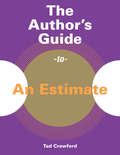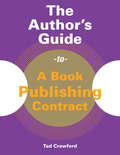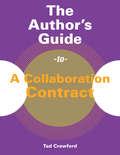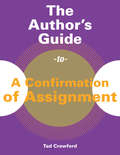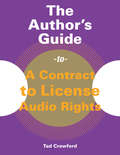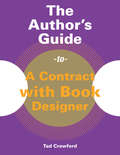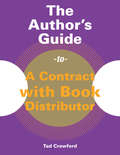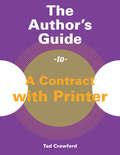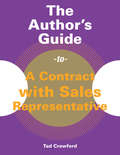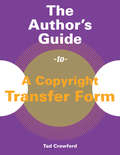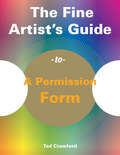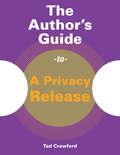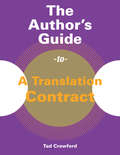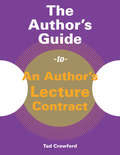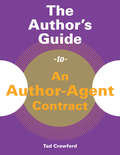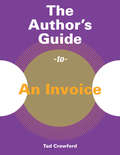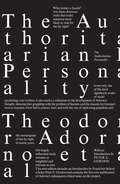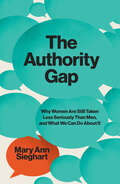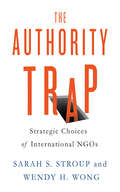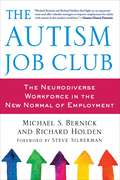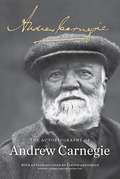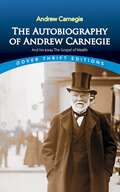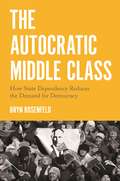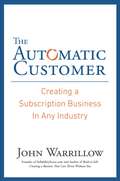- Table View
- List View
The Author's Guide to An Estimate
by Tad CrawfordPart of The Author's Guide to series, this classic guide provides information about the issues relevant to writers today. An estimate provides the author with an opportunity to discuss the assignment, important terms, and fees. This guide includes a helpful negotiation checklist as well as a sample contract.
The Author's Guide to a Book Publishing Contract
by Tad CrawfordPart of The Author's Guide to series, this classic guide provides information about the issues relevant to writers today. It acts as a reference for author's contracts, negotiating, subsidiary rights publishers as well as e-book publishers.
The Author's Guide to a Collaboration Contract
by Tad CrawfordPart of The Author's Guide to series, this classic guide provides information about the issues relevant to writers today. It acts as a reference for the legalities around and process of negotiating and selling a joint work. The book also includes a sample collaborative contract form.
The Author's Guide to a Confirmation of Assignment
by Tad CrawfordPart of The Author's Guide to series, this classic guide provides information about the issues relevant to writers today. Detailing the importance of what both author and client should do before creating a binding contract, this guide provides the necessary forms and checklists to negotiate and confirm an assignment, without needless disputes and disruptions.
The Author's Guide to a Contract to License Audio Rights
by Tad CrawfordPart of The Author's Guide to series, this classic guide provides information about the issues relevant to writers today. It acts as a reference that features issues surrounding licensing the audio rights to a book, and also includes a negotiation checklist and sample contract.
The Author's Guide to a Contract with Book Designer
by Tad CrawfordPart of The Author's Guide to series, this classic guide provides information about the issues relevant to writers today. This reference guide offers singhts into the differences between commercial and self-publishing. Also included are a negotiation checklist and sample contract with a book designer.
The Author's Guide to a Contract with Book Distributor
by Tad CrawfordPart of The Author's Guide to series, this classic guide provides information about the issues relevant to writers today. For an author who has decided to self-publish, this is a critical guide. It describes the differences and advantages of either selling books outright or cosigning the books to a distributor, and includes a negotiation checklist as well as a sample contract.
The Author's Guide to a Contract with Printer
by Tad CrawfordPart of The Author's Guide to series, this classic guide provides information about the issues relevant to writers today. It offers insights into dealing with printers, should the author choose the path of self-publisher.
The Author's Guide to a Contract with Sales Representative
by Tad CrawfordPart of The Author's Guide to series, this classic guide provides information about the issues relevant to writers today. This reference guide offers insights for self-publishers who seeks to obtain a sales representative, and the scope of their role in the sale's process. The guide provides a neogiation checklist and sample Sales Representative contract.
The Author's Guide to a Copyright Transfer Form
by Tad CrawfordPart of The Author's Guide to series, this classic guide provides information about the issues relevant to writers today. Learn about the basic parts of a copyright transfer form while completing a negotiation checklist and consulting a sample transfer form.
The Author's Guide to a Permission Form
by Tad CrawfordPart of The Author's Guide to series, this classic guide provides information about the issues relevant to writers today. It contains an explanation of the differences of copyrighted materials. The included negotiation checklist and permission form are useful tools in evaluating the differences and avoiding copyright infringement or a breach of contract.
The Author's Guide to a Privacy Release
by Tad CrawfordPart of The Author's Guide to series, this classic guide provides information about the issues relevant to writers today. It explains how an author can avoid the risk of violating an individual's right to privacy and publicity. A helpful negotiation checklist and a sample of a privacy release form are included.
The Author's Guide to a Translation Contract
by Tad CrawfordPart of The Author's Guide to series, this classic guide provides information about the issues relevant to writers today. For a self-publisher interested in publishing his or her book in different languages, this guide details the necessary legal steps one should take. It also includes a sample translation contract as well as a useful negotiation checklist.
The Author's Guide to an Author's Lecture Contract
by Tad CrawfordPart of The Author's Guide to series, this classic guide provides information about the issues relevant to writers today. As lecturing is an important source of income for many authors, this guide can help ensure that everything goes smoothly. It describes specific details such as transportation, necessary materials, cancellation policies, and location, and includes a sample contract and negotiation checklist.
The Author's Guide to an Author--Agent Contract
by Tad CrawfordPart of The Author's Guide to series, this classic guide provides information about the issues relevant to writers today. Learn the basic steps to take, and benefits of, acquiring an agent. A negotiation checklist is included to help define the terms of the contract.
The Author's Guide to an Invoice
by Tad CrawfordPart of The Author's Guide to series, this classic guide provides information about the issues relevant to writers today. Detailing the importance of including an estimate, a confirmation of assignment agreement, and an invoice, this guide includes a negotiation checklist with the terms an invoice should contain as well as a sample invoice.
The Authoritarian Personality
by Daniel J. Levinson Theodor Adorno Else Frenkel-Brunswik R. Nevitt SanfordA new edition of this classic study of the origins of anti-SemitismBringing together the findings of psychoanalysis and social science, this book grew out of an urgent commitment to study the origins of anti-Semitism in the aftermath of Hitler's Germany. First published in 1951, it was greeted as a monumental study blazing new trails in the investigation of prejudice. As offshoots of ethnocentrism, anti-semitism and fascism cast new and dark shadows on the world, the topic again demands study and social action. "The Authoritarian Personality" remains an important document for our time.
The Authority Gap: Why Women Are Still Taken Less Seriously Than Men, and What We Can Do About It
by Mary Ann SieghartAn incisive, intersectional look at the mother of all gender biases: a resistance to women’s authority and power. Every woman has a story of being underestimated, ignored, challenged, or patronized in the workplace. Maybe she tried to speak up in a meeting, only to be talked over by male colleagues. Or a client addressed her male subordinate instead of her. Despite the progress we’ve made toward equality, we still fail, more often than we might realize, to take women as seriously as men. In The Authority Gap, journalist Mary Ann Sieghart examines the wide-ranging implications of this critical gender bias. She explores its intersections with race and class biases and the measures we can take to bridge the gap. With precision and insight, she marshals a wealth of data from a variety of disciplines—including psychology, sociology, politics, and business—and interviews pioneering women like Booker Prize winner Bernardine Evaristo and Janet Yellen. The Authority Gap offers a “a credible roadmap that is capable of taking women from the margins to the center” (Mary McAleese, former president of Ireland).
The Authority Trap: Strategic Choices of International NGOs
by Sarah S. Stroup Wendy H. WongNot all international nongovernmental organizations (INGOs) are created equal, Some have emerged as "leading INGOs" that command deference from various powerful audiences and are well-positioned to influence the practices of states, corporations, and other INGOs. Yet Sarah S. Stroup and Wendy H. Wong make a strong case for the tenuous nature of this position: in order to retain their authority, INGOs such as Greenpeace, Oxfam, and Amnesty International refrain from expressing radical opinions that severely damage their long-term reputation. Stroup and Wong contend such INGOs must constantly adjust their behavior to maintain a delicate equilibrium that preserves their status.Activists, scholars, and students seeking to understand how international organizations garner and conserve power—and how this affects their ability to fulfill their stated missions—will find much of value in The Authority Trap. The authors use case studies that illuminate how INGOs are received by three main audiences: NGO peers, state policymakers, and corporations. In the end, the authors argue, the more authority an INGO has, the more constrained is its ability to affect the conduct of world politics.
The Autism Full Employment Act: The Next Stage of Jobs for Adults with Autism, ADHD, and Other Learning and Mental Health Differences
by Michael Bernick Louis A. VismaraImpactful and integral to our economic recovery after the pandemic, The Autism Full Employment Act will rebuild and approve autism employment programs. Employment remains the issue today for many adults with autism. During the pandemic of 2020, authors Michael Bernick and Dr. Lou Vismara, along with other adults with autism, practitioners, and advocates, set out to develop an Autism Full Employment Act. At the time, the national economy was decimated, and it was clear that it would need to be rebuilt, starting in 2021 and beyond. The Act is an attempt not only to rebuild autism employment programs, but also to address the limitations and shortcomings of the current system. The Autism Full Employment Act shows how there can be a place in the job world for the wide range of adults with autism, ADHD, and other learning and mental health differences—many of whom are not employed today. Bernick and Dr. Vismara review the autism employment initiatives in recent years among major employers, state and local governments, autism-focused businesses, and autism transition programs, and present strategies to build on these initiatives. They set out more fully the meanings of &“autism talent advantage,&” &“autism friendly workplace,&” and &“employment for the more severely impacted.&” Six broad strategy areas are explored. Interspersed with these six strategy areas are notes on related issues of &“professionalizing the direct support workforce,&” &“transitions,&” and &“comorbidities.&” Bernick and Dr. Vismara end by considering why no government action or program can replace the employment journey of each adult with autism, but how instead the Act can hasten these journeys.
The Autism Job Club: The Neurodiverse Workforce in the New Normal of Employment
by Steve Silberman Richard Holden Michael BernickThe Autism Job Club is a groundbreaking book for bringing adults with autism and other neuro-diverse conditions into the work world. This second edition of The Autism Job Club includes a new Foreword by Steve Silberman, author of the best-selling NeuroTribes, along with an Afterword by the authors. The Afterword covers the many employment initiatives for adults on the autism spectrum launched just in the three years since the book was originally published. The book has its basis in the autism job club that the authors have been part of in the San Francisco Bay Area, the job-creation and job-placement efforts the club has undertaken, and similar efforts throughout the United States. The authors review the high unemployment rates among adults with autism and other neuro- diverse conditions more than two decades after the ADA. Bernick and Holden also outline and explain six strategies that, taken together, will reshape employment for adults with autism: the art of the autism job coach; the autism advantage in technology employment; autism employment and the internet economy; autism employment and the practical/craft economy; autism and extra-governmental job networks; autism and public service employment.The Autism Job Club is a vital resource for adults with autism, their families, and advocates who are committed to neuro-diverse employment, not unemployment. But it also speaks to a far broader audience interested in how to carve out a place for themselves or others in an increasingly competitive job world.
The Autobiography of Andrew Carnegie
by Andrew CarnegieAndrew Carnegie, the great steel-baron-turned-philanthropist, was an industrialist unlike any other. His famous dictum, that he who dies rich dies disgraced, has inspired a generation of twenty-first-century philanthropists to follow in his footsteps and put their money towards philanthropic causes. He had an unwavering belief in distributing wealth for good, and systematically and deliberately gave away the bulk of his riches throughout his lifetime. Born in 1835, he emigrated with his family to the United States from Scotland at a young age. His first job was in a cotton factory, and he later worked as an errand boy. The industrial age brought great opportunities for Mr. Carnegie. With drive and hard work, he amassed a fortune as a steel tycoon, and by adulthood the errand boy was one of the richest and most generous men in the United States. A strong dedication to giving back guided him throughout his life and career. During his own lifetime, he put his ideas into action by creating a family of organizations that continue to work toward improving the human condition, advancing international peace, strengthening democracy, and creating social progress that benefits men, women and children both in the United States and around the globe. Here, in the reissue of the classic autobiography that has inspired generations, is the rags-to-riches tale of the life and philosophies of one of the most celebrated industrialists and philanthropists in history. From his humble beginnings as a poor Scottish immigrant to his immense success in business, Andrew Carnegie outlines the principles that he lived by and that today serve as the pillars of modern philanthropy.
The Autobiography of Andrew Carnegie and His Essay: The Gospel Of Wealth (Dover Thrift Editions)
by Andrew CarnegieA native of Scotland, Andrew Carnegie emigrated to Allegheny, Pennsylvania, in his youth and through voracious reading and personal initiative became one of the richest men in American history. His autobiography recounts the real-life, rags-to-riches tale of an immigrant's rise from telegrapher's clerk to captain of industry and steel magnate. One of the earliest memoirs of an American capitalist, The Autobiography of Andrew Carnegie appeared shortly after the 84-year-old author's death in 1919.Industrialist, innovator, scholar, and philanthropist, Carnegie gave away more than 90 percent of his wealth for the establishment of libraries, schools, and hospitals. In addition to describing how he amassed his enormous fortune, his memoirs chronicle the deliberate and systematic distribution of his fortune for the enlightenment and betterment of humanity. This volume includes Carnegie's essay "The Gospel of Wealth," in which he outlines his philanthropic views, stating that "the millionaire will be but a trustee for the poor," bestowing charity on those willing to help themselves.
The Autocratic Middle Class: How State Dependency Reduces the Demand for Democracy (Princeton Studies in Political Behavior #26)
by Bryn RosenfeldHow middle-class economic dependence on the state impedes democratization and contributes to authoritarian resilienceConventional wisdom holds that the rising middle classes are a force for democracy. Yet in post-Soviet countries like Russia, where the middle class has grown rapidly, authoritarianism is deepening. Challenging a basic tenet of democratization theory, Bryn Rosenfeld shows how the middle classes can actually be a source of support for autocracy and authoritarian resilience, and reveals why development and economic growth do not necessarily lead to greater democracy.In pursuit of development, authoritarian states often employ large swaths of the middle class in state administration, the government budget sector, and state enterprises. Drawing on attitudinal surveys, unique data on protest behavior, and extensive fieldwork in the post-Soviet region, Rosenfeld documents how the failure of the middle class to gain economic autonomy from the state stymies support for political change, and how state economic engagement reduces middle-class demands for democracy and weakens prodemocratic coalitions.The Autocratic Middle Class makes a vital contribution to the study of democratization, showing how dependence on the state weakens the incentives of key societal actors to prefer and pursue democracy.
The Automatic Customer: Creating a Subscription Business in Any Industry
by John WarrillowThe lifeblood of your business is repeat customers. But customers can be fickle, markets shift, and competitors are ruthless. So how do you ensure a steady flow of repeat business? The secret--no matter what industry you're in--is finding and keeping automatic customers.These days virtually anything you need can be purchased through a subscription, with more convenience than ever before. Far beyond Spotify, Netflix, and New York Times subscriptions, you can sign up for weekly or monthly supplies of everything from groceries (AmazonFresh) to cosmetics (Birchbox) to razor blades (Dollar Shave Club).According to John Warrillow, this emerging subscription economy offers huge opportunities to companies that know how to turn customers into subscribers. Automatic customers are the key to increasing cash flow, igniting growth, and boosting the value of your company.Consider Whatsapp, the internet-based messaging service that was purchased by Facebook for $19 billion. While other services bombarded users with invasive ads in order to fund a free messaging platform, Whatsapp offered a refreshingly private tool on a subscription platform, charging just $1 per year. Their business model enabled the kind of service that customers wanted and ensured automatic customers for years to come.As Warrillow shows, subscriptions aren't limited to technology or media businesses. Companies in nearly any industry, from start-ups to the Fortune 500, from home contractors to florists, can build subscriptions into their business.Warrillow provides the essential blueprint for winning automatic customers with one of the nine subscription business models, including:The Membership Website Model: Companies like The Wood Whisperer Guild, ContractorSelling.com, and DanceStudioOwner.com offer access to highly specialized, high quality information, recognizing that people will pay for good content. This model can work for any business with a tightly defined niche market and insider information.The Simplifier Model: Companies like Mosquito Squad (pest control) and Hassle Free Homes (home maintenance) take a recurring task off your to-do list. Any business serving busy consumers can adopt this model not only to create a recurring revenue stream, but also to take advantage of the opportunity to cross-sell or bundle their services.The Surprise Box Model: Companies like BarkBox (dog treats) and Standard Cocoa (craft chocolate) send their subscribers curated packages of goodies each month. If you can handle the logistics of shipping, giving customers joy in something new can translate to sales on your larger e-commerce site.This book also shows you how to master the psychology of selling subscriptions and how to reduce churn and provides a road map for the essential statistics you need to measure the health of your subscription business.Whether you want to transform your entire business into a recurring revenue engine or just pick up an extra 5 percent of sales growth, The Automatic Customer will be your secret weapon.
